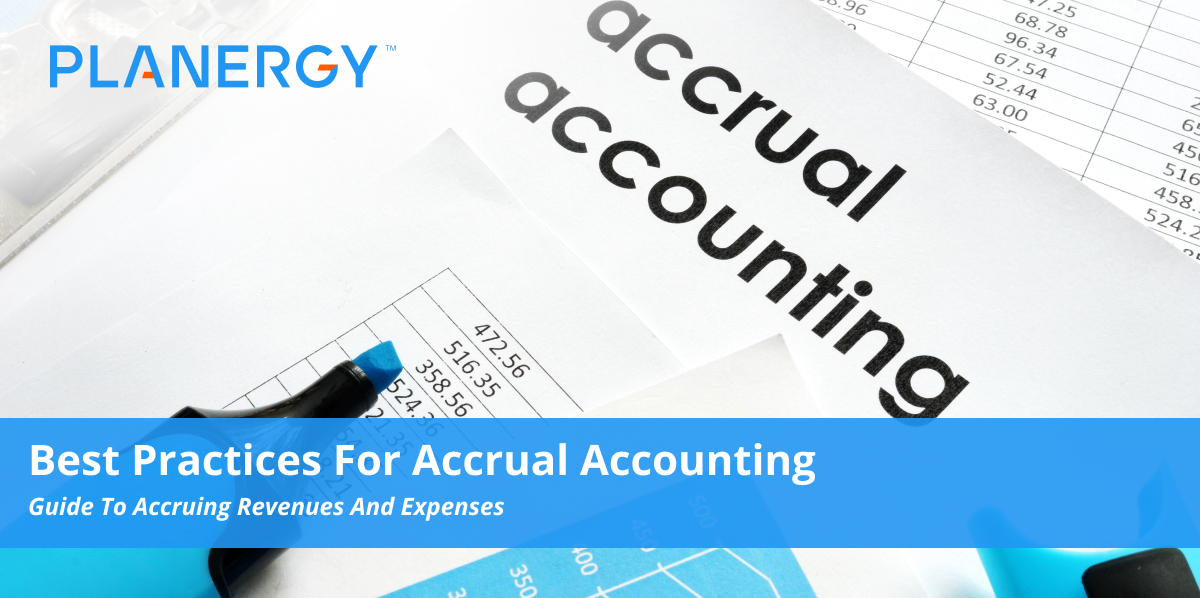What is accrual accounting?
Business owners can choose from two different accounting methods: cash basis accounting or accrual accounting.
Cash basis recognizes revenue when it’s received, not when it’s earned. For example, if you send Jane an invoice for $200 for services rendered, the $200 will be recognized as revenue when Jane pays the invoice.
Many smaller businesses start out using cash basis accounting, later switching to the more accurate accrual accounting as their business grows. However, if your business remains very small, and you don’t sell products, there is no reason to switch from cash basis accounting.
In accrual accounting, when you perform services and send your customer an invoice, the revenue is recorded at the time the service is performed. So rather than waiting for Jane to send in her $200 payment, you recognize the $200 at the time the service has been completed or the product sold.
Though cash basis accounting is simpler, the majority of businesses find using the accrual method more beneficial for their business. CPAs also recommend that business owners, particularly those that carry inventory, operate on an accrual basis since it provides a more accurate picture of the true financial health of the business.
| Cash Accounting | Accrual Accounting |
| Recognizes revenue when money is received | Recognizes revenue when earned (project is completed or products sold) |
| Recognizes expenses when they are paid | Recognizes expenses when incurred and billed, not when paid |
| Can reduce taxes since money is not taxed until received | Can result in a larger tax burden since tax is paid on money not yet received |
| Suitable for smaller businesses and sole proprietors | Required for business with $25 million in revenue but recommended by CPAs and accountants |
What are accruals?
The accruals process is based on two accounting principles. The first principle, called the matching principle states that revenue and expenses should be matched to the period in which they occurred, as opposed to when revenues are received and/or when a bill is paid. The purpose of accruals is to ensure that revenues and expenses are matched correctly.
The second accounting principle used in accrual accounting is the revenue recognition principle. The revenue recognition principle states that revenue should be recognized when it is earned or realized: in other words when services are performed or products sold.
It’s not only revenue that is affected by cash or accrual basis in accounting. Expenses are also commonly accrued to better reflect when the expense actually happened, not when the bill is paid.
For example, the roof at your office needs to be repaired. Shortly after the repair, which was completed in January, you receive a bill for $1,500, with Net 30 terms, which will be entered into accounts payable as a repair expense in January but paid in February. Using cash basis accounting, you would recognize the expense in February, when the bill is paid, not when the expense has been incurred.
Accruals and expenses – what are the differences?
A lot of people may view accruals as expenses, but that’s not the case. Though both are part of the accrual accounting process, accruals and expenses are two completely different types of accounting transactions. Accruals are revenue or expenses that have occurred but cash has not yet changed hands, while an expense is money that has been spent on something. Things can get complicated when prepaid expenses enter the equation, but while prepaid expenses require a journal entry each month, they are not considered accrued expenses.
Accrual-based accounting presents numerous advantages, including more accurate financial reporting, GAAP compliance, better planning and analysis.
What are the most common accruals?
If you use accounting software, many of your accruals are completed for you automatically. For example, when you sell to a customer on credit, you record the revenue at the time of the sale, even though your customer may not pay you until the following month. As a result, your accounts receivable balance remains high until your customer pays. Once you receive payment, your accounts receivable balance drops, while your cash increases.
These automatic accruals that are completed by your accounting software do not need to be reversed. However, any accrual that requires a journal entry, such as payroll accruals, will need to be reversed the following month. Many accounting software applications include automatic reversals, but if your system doesn’t, be sure to reverse your accruals when the actual revenue is received or expenses entered.
Here are a few examples of common accruals.
Revenues
Utility bills are a great example of accruing revenue. Service for your cellphone, your landline, or your gas or electric service is typically delivered to you before receiving a bill for that service, with the total services used later calculated and billed.
For example, if you use 50 units of gas in January, and each unit is $1.50, your total bill would be $75. The accountant for the gas company would accrue revenue of $75 for January, even though you will likely pay the bill in February. Doing so ensures that the gas company is accounting for its revenues properly by posting them in the month that the service occurs rather than when you pay your bill.
Expenses
Wages are perhaps the most frequently accrued expense you may have, and probably the trickiest because they have to be reversed as well. For example, if you commonly pay your employees on the 1st and the 15th of the month, you will need to accrue the previous month’s wages.
Let’s say your employee John worked 80 hours from January 16 through January 31. Because he will not be paid for these hours until February 1, you will need to accrue and record his payroll expenses for January, including wages, withholding, and taxes. Once payroll is processed on February 1, you will need to reverse the accrual, or payroll expenses will be overstated for February.
But payroll isn’t the only expenditure that you will need to accrue. For example, you recently contacted your attorney regarding a legal issue with an employee. Your consultation was on the 30th of January, but you haven’t yet received a bill from your attorney. Because the consultation took place in January, it needs to be recorded as an accrued expense for January, since a bill has not yet been received. Once you receive and enter the bill, you can reverse the accrual.
Estimating and calculating accruals
When entering an accrual, you may need to estimate the amount. While you’ll have exact totals for payroll accruals, other expenses may need to be estimated, such as the attorney’s bill mentioned earlier. Estimating can be a tricky process, particularly if you’re estimating an expense you have not incurred before or that can vary from month to month. For example, you have yet to receive your water bill for the month of January. And while you can use prior water bills as a guideline for estimating your January bill, you have no idea how much water you’ve actually used for the month.
In cases like this, when you don’t have a clear idea of how much to accrue, you can use your prior month’s expense and add 10% to the total. For example, if your December bill was $85, you can add 10% to that and accrue $93.50 for your January water bill by entering the amount as a debit. Once you receive the bill, you will then enter the actual total and reverse your accrual.
It’s always best to underestimate a revenue accrual and overestimate an expense accrual or you may end up with inaccurate financial statements for the month(s) that the accruals were recorded.
The benefits (and drawbacks) of accrual accounting
Recommended by CPAs and accountants, accrual accounting is the preferred method of accounting for millions of businesses simply because it presents a more accurate financial picture, not only for internal use but for investors and creditors as well. In addition, using accrual accounting will ensure that your business is GAAP (generally accepted accounting principles) compliant, which may be important as your business grows and expands.
Though many smaller businesses and startups may use cash basis accounting initially, they often find themselves moving to accrual-based accounting eventually, since it presents numerous advantages, including the following:
- More accurate financial reporting: Accrual accounting presents a more accurate picture of the financial health of your business. For example, if you earn $2,500 in revenue, but your customers don’t pay you until February, your earned revenue in January will be $0, which is not an accurate representation of your financial position.
- GAAP compliance: For very small business owners, GAAP compliance may not be a priority. But if you’re looking for investors or plan to apply for a business loan in the future, being GAAP compliant is essential.
- Better planning and analysis: Accruals impact both your balance sheet accounts and your income statement. To create accurate year-end budgets and forecasts, both must be accurate. Accrual accounting does just that, providing you with more accurate financial statements and a much clearer picture of both income and expenses incurred during the correct accounting period.
That said, for small business owners without the benefit of an on-staff accountant or bookkeeper, accrual accounting can pose some difficulties. It’s also important to remember that switching from cash basis to accrual basis accounting requires the approval of the IRS, so keep that in mind when you initially choose the basis for your business. Accrual accounting can also make it easier to hide poor business performance; masking cash flow problems your business may be having, since revenue recorded but not yet received does not increase your cash balance. In those cases, it’s important to keep close track of your business cash flow regularly to avoid potential cash flow issues.
In addition, accrual accounting may not be the best fit for your business if you only accept cash payments and do not plan on offering credit to your customers in the future.
Is accrual accounting right for your business?
With two methods of financial accounting to choose from, very small businesses and start-ups may prefer cash basis accounting, but if you’re planning on growing your business, currently managing inventory, or plan to seek out investors or apply for loans, using accrual accounting is the best choice.




